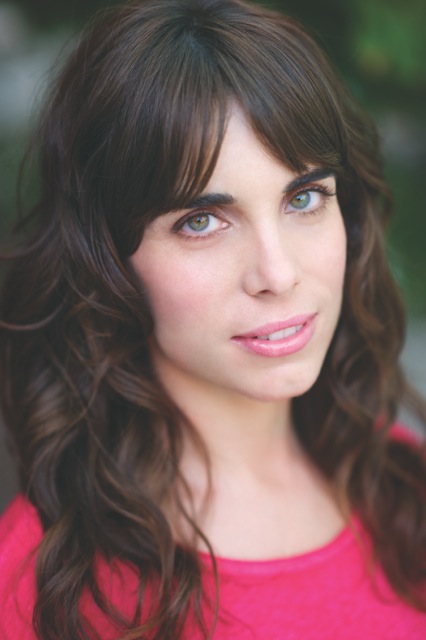 A native of Danvers, Mass., Domenica Ruta graduated from Oberlin College and earned an MFA from the Michener Center for Writers at UT-Austin. She's been the recipient of residencies at several artists' communities including the Blue Mountain Center, Jentel, the MacDowell Colony and Yaddo. Her memoir, With or Without You, is her debut. Ruta took a moment from working on her upcoming novel to speak with us about learning from the past and turning it into art.
A native of Danvers, Mass., Domenica Ruta graduated from Oberlin College and earned an MFA from the Michener Center for Writers at UT-Austin. She's been the recipient of residencies at several artists' communities including the Blue Mountain Center, Jentel, the MacDowell Colony and Yaddo. Her memoir, With or Without You, is her debut. Ruta took a moment from working on her upcoming novel to speak with us about learning from the past and turning it into art.
In With or Without You, you focus heavily on your mother's influence on your life. What important lessons have you learned from her?
I feel so lucky to have had a mother who could laugh so deeply. For her, and for us, comedy was a rich psycho-spiritual experience. As a genetic gift, I can't think of anything more important to my survival. I see so many people in this world who live as though a storm cloud hovers overhead; I've never had that problem, because my mother armed me with this sublime sense of humor. Like athleticism, it is in part something you are born with, but also something that needs nurturing to develop. It's the precondition for finding beauty--humor clears away the brush, tills an open space in the mind so that instances of beauty can be seeded and grow. For me it is so necessary in the process of making art and a happy life.
If you could go back in time and talk to your teenage self, what would you say?
This is hard. I'm tempted to beg her to get sober. Preserve those brain cells you are about to slaughter for next decade and a half! You'll read Faulkner and for a moment touch the divine--you'll "get" it, what he's doing, how you can do it, too--then you'll forget it all a second later. All of your best ideas--the human frailty of your friends and teachers, the searing connections between mind and body, the metaphors echoing everywhere as though in a universal song--will evaporate as soon as you have them. You won't learn as much as you can! You won't grow!
But then again, I needed every scrape and burn to become the person I am. I couldn't learn the easy way--I think few people can. Suffering is a good teacher. So maybe I would just tell that teenager to relax and stop worrying about her body--it's fine the way it is and there are much more interesting obsessions in this world. I would also encourage her to stay out of the sun. And learn Spanish before the plasticity of her brain dries out.
Tell us about your creative process.
For every three to four solid hours of writing, there are an equal number of hours in which I pace, fret, clean, fuss, open and close the refrigerator--without actually eating, mind you, just saying hello to the produce, I guess--then some more worrying and cleaning. On top of that, I've spent enormous amounts of time excoriating myself for this waste of time, which becomes a vicious cycle. Funny how a little validation can change everything. Once Cindy Spiegel bought my book, it suddenly occurred to me that perhaps I was doing something right, that maybe these hours of discursiveness are actually an essential part of my process. So now I do what I've always done--10 a.m. to 2 p.m.: fidget; 2 p.m. to 6 p.m.: work--just with more joy and (slightly) less reproach.
We hear that running has become a big part of your life. Every runner seems to have an essential playlist. What's on yours?
I discovered runner's high in those dark first months of my sobriety, and it was as essential to me as antidepressants or acupuncture have been to other recovering addicts. To get me through a tough run, long distance or not, I've relied on selected songs and/or entire albums of the following artists on shuffle: Amy Winehouse, Biggie, Bowie, the Cars, Florence and the Machine, the Fugees, Liz Phair, M.I.A., Michael Jackson, the Pixies, the Stones, the Supremes, the Talking Heads and U2. Though there have been runs when I just listened to the theme from Rocky on repeat.
Your book is intensely personal. How did you decide to tell such intimate stories to the world?
I tried not to think about that aspect for the first draft. I wrote as if no one in the world would ever read a word of it, and told myself, if the issue of personal revelation becomes relevant, I will be more grateful to have this problem than I will be worried. But this approach is critical to writing anything. There are too many voices telling you that everything is a bad idea from the start. I'd never get anywhere if I considered these things in the beginning stages of development. It's a good thing writing is 90% rewriting, because with every new draft, I was growing as a person and a craftsman. I was getting stronger and more confident in my decisions--what to tell, what not to tell.
What do you hope readers will learn or take away with them from your book?
The point of almost all memoirs, especially the sub-genre of trauma and recovery, is the simple promise that there is hope. I hope my book expands on this--that like hope, there is also beauty, everywhere and always, as long as you are willing to search for it. Ultimately I want readers to feel they've been given a good story, something worth retelling.
With or Without You has been compared to The Glass Castle and The Liar's Club. What do you feel sets your story apart from other memoirs?
I intentionally avoided memoirs as a genre during my drinking years because I didn't want anyone to ruin my pity party or kill my buzz. While writing the first few drafts of my memoir I continued this abstention, but this time to protect myself from being influenced. I didn't know what a memoir was supposed to look like structurally or sound like tonally, and this ignorance felt to me like a precious state, the ideal place to start. After a couple of drafts, when I felt like I knew the basic shape and texture of this thing I was writing and was secure in that at least, I went on a memoir spree with an intentionally innocent curiosity. How does So-and-So do it? It was a great experience. I remember the day I read that Mary Karr's mother had the same gun my mum did, and I was so happy. It felt like an omen, or a blessing from the queen. I think all of the mother-daughter stories, the addiction stories, the traumatic childhood stories, speak for themselves. I consider myself lucky to be another voice in this chorus. What we have in common as memoirists is a subjective observation of a common humanity. It's what everyone has in common, whether they write their life stories or not. --Jaclyn Fulwood



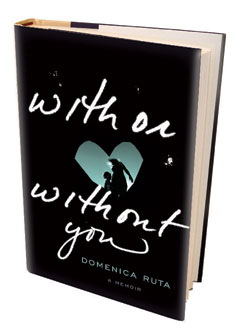
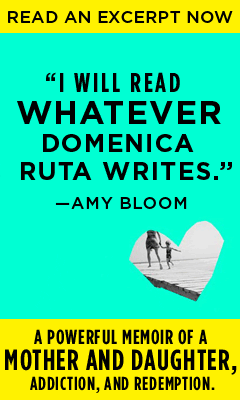
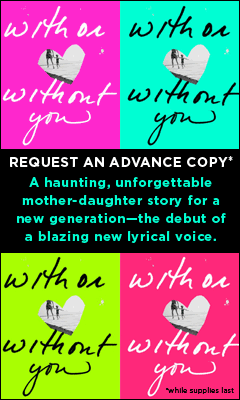
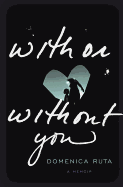

 A native of Danvers, Mass., Domenica Ruta graduated from Oberlin College and earned an MFA from the Michener Center for Writers at UT-Austin. She's been the recipient of residencies at several artists' communities including the Blue Mountain Center, Jentel, the MacDowell Colony and Yaddo. Her memoir, With or Without You, is her debut. Ruta took a moment from working on her upcoming novel to speak with us about learning from the past and turning it into art.
A native of Danvers, Mass., Domenica Ruta graduated from Oberlin College and earned an MFA from the Michener Center for Writers at UT-Austin. She's been the recipient of residencies at several artists' communities including the Blue Mountain Center, Jentel, the MacDowell Colony and Yaddo. Her memoir, With or Without You, is her debut. Ruta took a moment from working on her upcoming novel to speak with us about learning from the past and turning it into art.